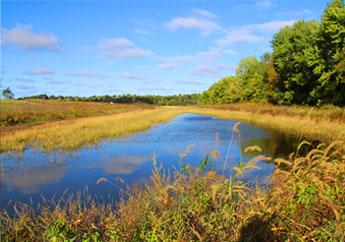
The federal Clean Water Act (CWA), passed in 1972, resulted in huge improvements in the nation’s waters. The CWA established the basic structure for regulating point source discharges of pollutants into the waters of the United States. The CWA essentially removed one major threat to clean water, but left another in place without any control: nonpoint source (NPS) pollution.
In 1987, the U.S. Congress passed the Water Quality Act and enacted Section 319 of the CWA. Section 319 establishes a non-regulatory national program to focus on nonpoint sources of water pollution. Under Section 319, states are required to identify their water bodies that cannot meet water quality standards without controlling nonpoint sources. States then adopt a nonpoint source management program to control the nonpoint source pollution. It is important to emphasize Section 319 does not place limits on nonpoint source pollution nor is there an enforcement mechanism.
The U.S. Environmental Protection Agency provides states with guidance to implement their state's nonpoint source management program. States with an EPA-approved nonpoint source management program may receive grant funding under Section 319(h). Grant funding can be used to support broader program activities to reduce nonpoint source pollution, or provide subgrants to eligible organizations for projects that target restoring or protecting waters impaired or threatened by nonpoint source pollution. For a glimpse of nonpoint source activities underway across the United States supported by Section 319, and the people who are making it happen, review EPA's report, National Nonpoint Source Program - a Catalyst for Water Quality Improvements.
Missouri's Nonpoint Source Management Program
The Mission: Protect and improve the quality of the state’s water resources using locally led approaches to address nonpoint source pollution impairments.
The Missouri Department of Natural Resources is the administrator of Missouri’s Nonpoint Source Management Program. The program is also a partner of the Natural Resources Conservation Service’s Mississippi River Basin Initiative (MRBI) and National Water Quality Initiative (NWQI). The program engages citizen organizations, federal, state and local governments, as well as universities and other stakeholders to plan for and implement nonpoint source control practices and monitor for improvements to water quality.
As part of its nonpoint source management program, states must identify their nonpoint source pollution-impaired or threatened waters. States must then develop and implement measures to improve their impaired waters and protect other high priority waters from nonpoint source pollution impacts. These measures are described, coordinated and prioritized in an EPA-approved Nonpoint Source Management Plan. To meet the requirements of its nonpoint source management program, state's must report annually on the state's progress and success in implementing their plan. Links to Missouri's Nonpoint Source Management Plan and annual reports are provided below.
As a state with an EPA-approved nonpoint source management program, EPA awards Section 319(h) funds to Missouri to help support the state's nonpoint source management program. The department passes a portion of the funds through as competitive subgrant awards to eligible entities to support a variety of statewide and locally led projects that target restoring and protecting waters impaired or threatened by nonpoint source pollution. The other portion of the fund supports the administrative requirements of the grant, along with a variety of other department nonpoint source activities.

